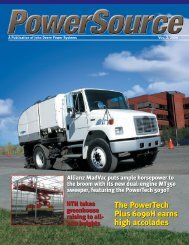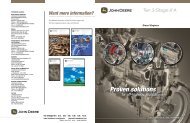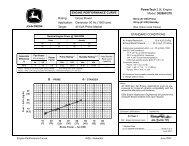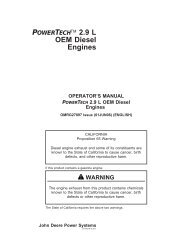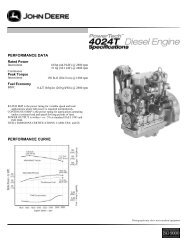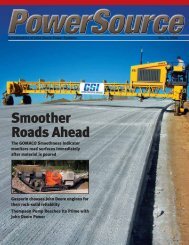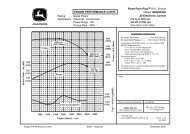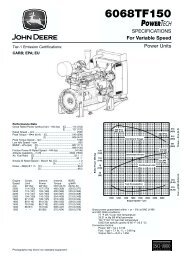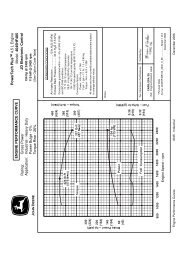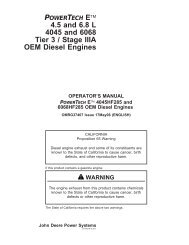OMRG25204 oem uncert & tier 1.pdf - John Deere Industrial Engines
OMRG25204 oem uncert & tier 1.pdf - John Deere Industrial Engines
OMRG25204 oem uncert & tier 1.pdf - John Deere Industrial Engines
- No tags were found...
Create successful ePaper yourself
Turn your PDF publications into a flip-book with our unique Google optimized e-Paper software.
Fuels, Lubricants, and CoolantAdditional Information About Diesel Engine Coolants and Supplemental CoolantAdditivesEngine coolants are a combination of three chemicalcomponents: ethylene glycol or propylene glycolantifreeze, inhibiting coolant additives, and qualitywater.Coolant specificationsSome products, including <strong>John</strong> <strong>Deere</strong> COOL-GARDPrediluted Coolant, are fully formulated coolants thatcontain all three components in their correctconcentrations. Do not add an initial charge ofsupplemental coolant additives to these fullyformulated products.Coolants meeting ASTM D6210 do not require aninitial charge of supplemental coolant additives.Some coolant concentrates, including <strong>John</strong> <strong>Deere</strong>COOL-GARD Coolant Concentrate, contain both glycolantifreeze and inhibiting coolant additives. Mix theseproducts with quality water, but do not add an initialcharge of supplemental coolant additives.Coolants meeting ASTM D4985 require an initialcharge of supplemental coolant additives.Replenish coolant additivesThe concentration of coolant additives is graduallydepleted during engine operation. Periodicreplenishment of inhibitors is required, even when<strong>John</strong> <strong>Deere</strong> COOL-GARD or another fully formulatedcoolant is used. Follow the recommendations in thismanual for the use of supplemental coolant additives.Why use supplemental coolant additives?Operating without proper coolant additives will result inincreased corrosion, cylinder liner erosion and pitting,and other damage to the engine and cooling system. Asimple mixture of ethylene glycol or propylene glycoland water will not give adequate protection.Use of supplemental coolant additives reducescorrosion, erosion, and pitting. These chemicalsreduce the number of vapor bubbles in the coolant andhelp form a protective film on cylinder liner surfaces.This film acts as a barrier against the harmful effectsof collapsing vapor bubbles.Avoid automotive-type coolantsNever use automotive-type coolants (such as thosemeeting ASTM D3306). These coolants do not containthe correct additives to protect heavy-duty dieselengines. They often contain a high concentration ofsilicates and may damage the engine or coolingsystem.Water qualityWater quality is important to the performance of thecooling system. Distilled, deionized, or demineralizedwater is recommended for mixing with ethylene glycoland propylene glycol base engine coolant concentrate.All water used in the cooling system should meet thefollowing minimum specifications for quality:Chlorides



